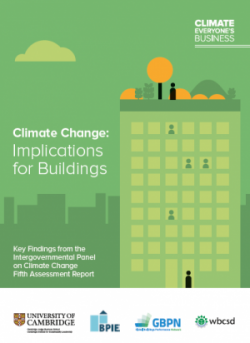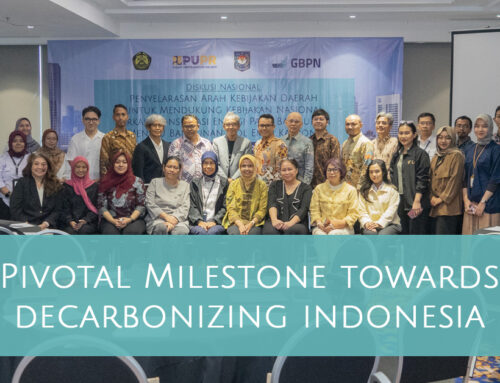[Report] Climate Change: Implications for Buildings
A new briefing issued today distils the key findings from the recently released Intergovernmental Panel on Climate Change (IPCC) Fifth Assessment Report (AR5) for the buildings sector.
AR5 represents the most comprehensive overview of climate science to date and is the fact base that will be used by governments and businesses to formulate climate policy in the coming years.
The GBPN worked together with the following partners on distilling the AR5 content into concise, clear, and relevant findings: Buildings Performance Institute Europe (BPIE), World Business Council for Sustainable Development (WBCSD), University of Cambridge Institute for Sustainability Leadership (CISL), Cambridge Judge Business School (CJBS), European Climate Foundation (ECF).
The report reveals that:
- In 2010, the world’s buildings accounted for 32% of global final energy use and 19% of all greenhouse gas (GHG) emissions. Under business-as-usual projections, use of energy in buildings globally could double or even triple by 2050.
- Widespread implementation of best practices and technologies could see energy use in buildings stabilise or even fall by 2050. Many mitigation options promise multiple co-benefits.
- Many barriers exist to greater uptake of energy-saving opportunities. But know-how exists on retrofitting and how to build very low- and zero-energy buildings, often at little marginal investment cost.
- The very long life-cycles of buildings create risks of energy use ‘lock-in’. Using state-of-the-art standards immediately, for both new and retrofit buildings, would alleviate this hazard.
- Buildings face major risks of damage from the projected impacts of climate change, having already experienced a big increase in extreme weather damage in recent decades.
The briefing highlights how the impacts of climate change such as heat stress, extreme precipitation, inland and coastal flooding, landslides, air pollution, drought, and water scarcity pose risks in urban areas that are amplified by a lack of essential infrastructure and services or by living in poor-quality housing and exposed areas. Improving housing and resilient infrastructure systems could significantly reduce vulnerability and exposure in urban areas.
Building codes and appliance standards, if well designed and implemented, have been among the most environmentally and cost effective instruments for emission reductions. Substantially strengthening these codes, adopting them in further jurisdictions, and extending them to more building and appliance types will be key factors in reaching ambitious climate goals and in helping adapt to the changing climate.
The briefing is being distributed across the buildings industry with a call for action to address this global threat.
Infographic from the report.
The report is one of a series of thirteen, based upon The Fifth Assessment Report (AR5) of the Intergovernmental Panel on Climate Change (IPCC). AR5 represents the most comprehensive overview of climate science to date and is the fact base that will used by governments and businesses to formulate climate policy in the coming years. Sustainable Fisheries Partnership, the European Climate Foundation, the University of Cambridge Programme for Sustainability Leadership (CISL) and the Cambridge Judge Business School have worked together to distil relevant AR5 findings into concise, clear, relevant findings and visuals derived from, and in line with, the original text.
The set of summaries cover the broad implications of climate change, how the IPCCC works and give an overview of the physical science, as well as adaptation and mitigation options. The specific summaries cover the energy sector, investors and financial institutions, the transport sector, the tourism industry, the agricultural sector, fisheries and aquaculture, the defence sector, primary industries, cities, buildings and employment.
Documents
![]() Template AR5 – Buildings v10 – Web Pages.pdf
Template AR5 – Buildings v10 – Web Pages.pdf![]() IPCC_AR5__Implications_for_Buildings__Infographic__WEB_EN (1).pdf
IPCC_AR5__Implications_for_Buildings__Infographic__WEB_EN (1).pdf
Related Report Bundles
Share This Story, Choose Your Platform!
Stay in touch with how we’re transforming the buildings sector
GBPN runs innovative building policy reform programs in key regions around the world that aim to tackle the climate emergency by decarbonising the buildings sector. Stay up to date with our newsletter.
Stay in touch with how we’re transforming the buildings sector
GBPN runs innovative building policy reform programs in key regions around the world that aim to tackle the climate emergency by decarbonising the buildings sector. Stay up to date with our newsletter.







